When searching for a Vet for your furry friend, it’s hard to really understand why your Vet became a Vet, what their specialities are, and their background. That’s why we have begun a series of interviewing local Vets in NYC. Please see below an interview with Dr. Livermore, Medical Director and Veterinarian Specializing in Dental Care at Pearly Bites with Jamie Ruden, founder of Dog Spotted.
Dr. Livermore, thank you so much for joining us! Can you start by telling us a little bit about yourself?
Thank you so much for having me, Jamie! I have been a companion animal family vet since graduating in 2008. I obtained my veterinary degree from the University of Guelph in Ontario, Canada. I was born and raised in the outer suburbs of Toronto. I always dreamed of living near white sandy beaches and palm trees, so I settled in Saint Petersburg, Florida, and spent over 10 years at a general practice there. It was time to move on and I was ready for a big change – so here I am in NYC!
As the lead Vet at Pearly Bites, can you share a little more what it means to be a specialist in the Veterinary space?
One thing I must be clear on is that I am not actually considered a “dental specialist”. To achieve this title, a veterinarian must complete a residency, which takes an additional 3-4 years on top of veterinary school, in addition to passing specific board certification exams.
At Pearly Bites, we focus on general practice level dentistry. As GP veterinarians, we are trained in surgery, dentistry, and medicine. However, we get interested in referring to specialists when complexities arise that are outside of the scope of what we do. Whether it be in regular practice or specific treatments that can only be treated by a specialist. A good example is a root canal. I don’t perform root canals!
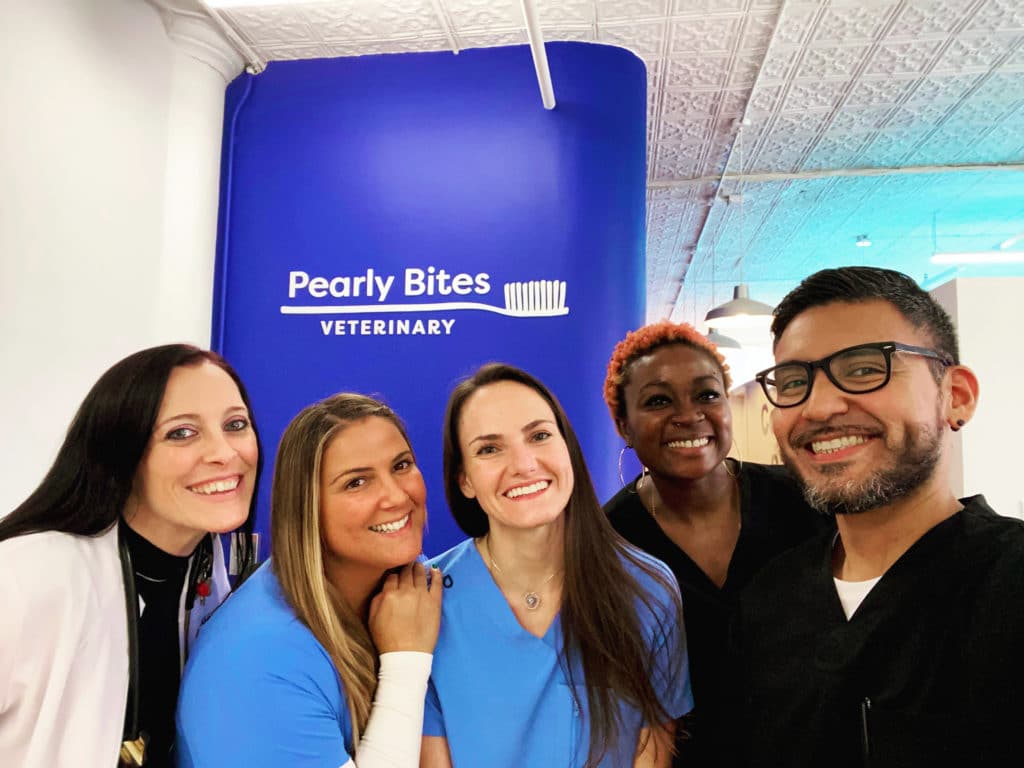
How does a practice like Pearly Bites differ from a General Practice that covers all types of surgeries?
At Pearly Bites, we are set up exclusively for dental consultations and dental surgery. Our surgical suite is very spacious and designed with only dentistry in mind. We have two wet tables, two anesthetic machines with all the bells and whistles to closely monitor our patient’s vitals and a digital dental radiology unit. In the general practice setting, most of the hospital consists of exam rooms, a pharmacy, a treatment room, offices, and a surgery suite.
Many general practices have very little to no space allocated for dental surgery. Often hospitals perform their dentals in the treatment room, where there are a lot of other things going on at the same time. It can be quite chaotic!
How can a dog parent know when they need to come to a dentist practice? What are some signs?
Sadly, a lot of times people have no idea their dogs are in need of serious dental work. Dental disease is the number one diagnosed condition in companion animals and it is usually documented at a very young age. Dogs will eat and play despite having serious oral problems. The first sign people may notice is bad breath. They tend to think it is “normal” for their pet to have a foul breath, but it is actually an indicator of periodontal disease or dental infection. As the disease becomes more severe, people may notice blood on their dog’s toys, decreased interest in chewing toys, drooling, dropping food from their mouth or favoring one side over the other while eating.
Is going to a dental practice like yours more cost-effective and if so, why?
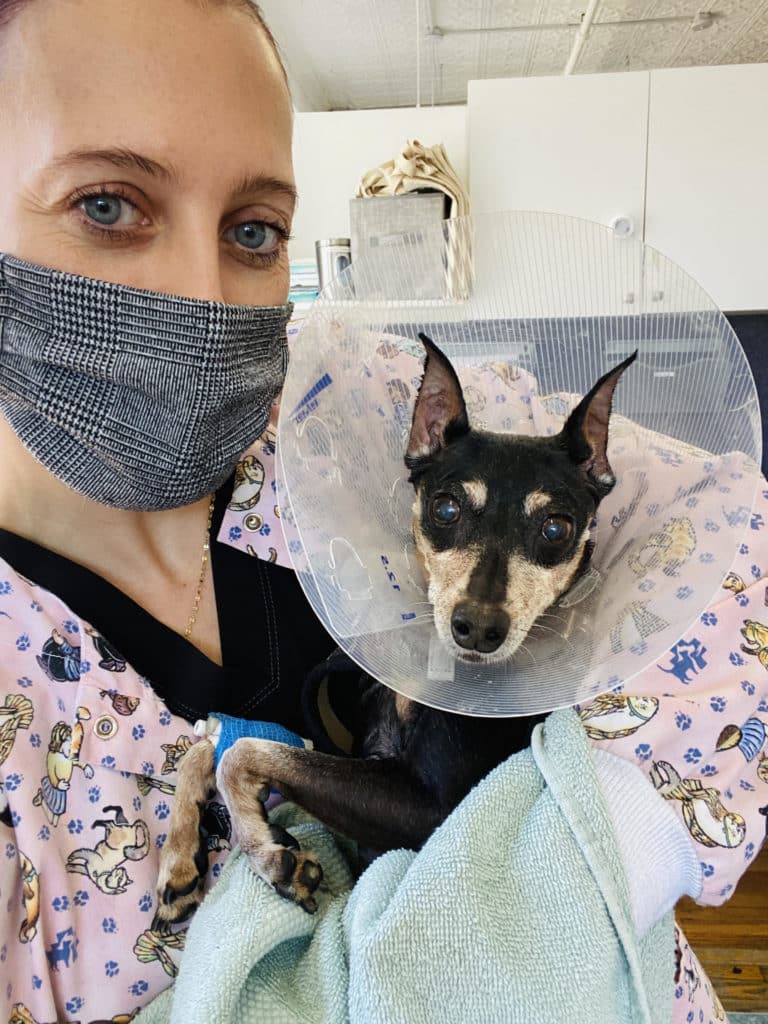
I think our price points are reasonably competitive at Pearly Bites. Since we focus only on dentistry, there are some overhead costs that are eliminated. That being said, if you are performing high-quality procedures, including excellent perioperative pain management, hypervigilant anesthetic monitoring, not rushing the extractions, doing pre and post-extraction radiographs, and suturing all extraction sites closed, it is inherently a costly service to provide. We definitely don’t cut any corners at Pearly Bites!
So what started it all? Why did you become a Vet?
I became interested in veterinary medicine as a teenager when my Bichon, Maximus, became acutely paralyzed after herniating a disc in his spine. He went to the University of Guelph teaching hospital to have back surgery. It was very scary and stressful, but he made an amazing recovery. I was so touched by the care and compassion that was shown to him and my family, I wanted to be able to do that for people and their precious pets.
What is it like being a Vet? What is your favorite part of the job?
Being a vet is both challenging and rewarding. The days are long and often without any breaks; procedures can be very lengthy and sometimes very stressful. Clients can be demanding and emotional, which is totally understandable, but sometimes that makes our days a lot harder! My favorite part of being a vet is definitely seeing the improvement in a pet after they have undergone major dental work. At their 2-week recheck, they are visibly happier and healthier. Oftentimes clients tell us that they are shocked by how much younger their dogs are acting after they’ve healed – “they are acting like puppies again!” I live for that!
What is something you wish dog parents knew before a dental appointment?
I wish everyone would start earlier with routine dental prophylaxis, so we could catch periodontal disease in its infancy and prevent its progression. Many of our clients are bringing in middle-aged to geriatric pets with severe dental disease, necessitating treatment with many dental extractions. In these cases, I wish people knew that their pets will be healthier without the diseased teeth and that they will be able to eat without dentition. Domestic dogs today do not need their teeth to hunt and sustain themselves. We can feed our pets according to their needs and limitations, and they do great!
Any tips for dog parents for dental hygiene to keep costs down in the future? Some product recommendations?
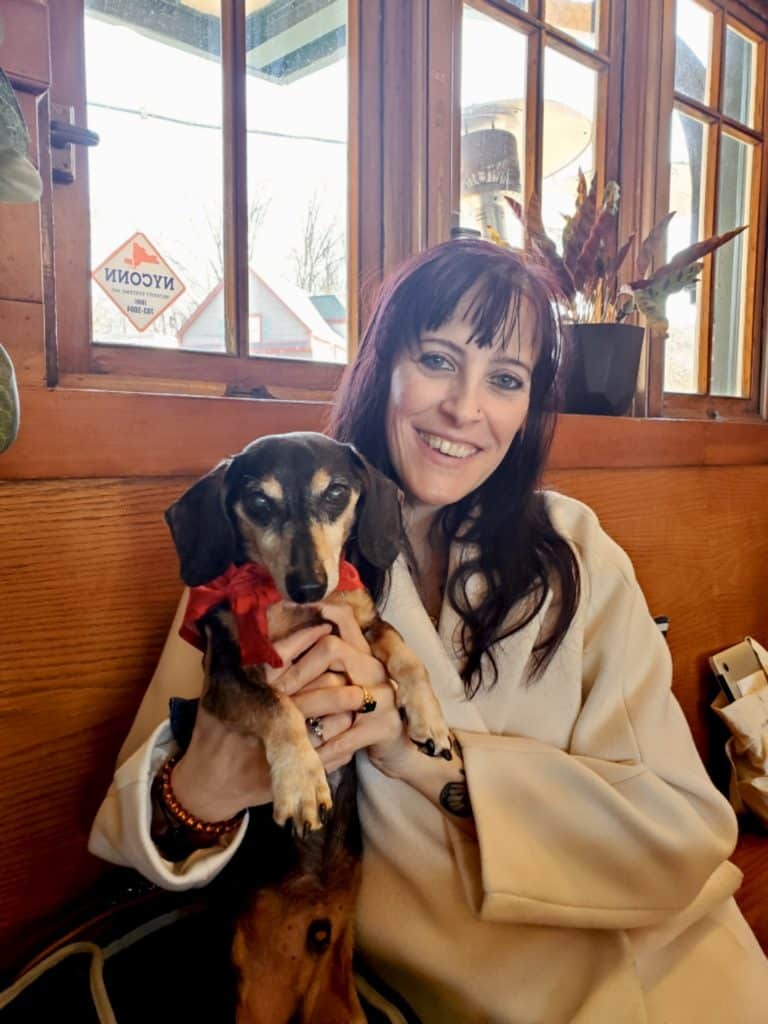
The most effective way to reduce plaque and tartar is daily tooth brushing. Plaque is an invisible biofilm that forms daily and it is the culprit in periodontal disease. Mechanically removing this layer is very important in keeping disease at bay. That being said, we still recommend annual deep cleaning and intraoral radiographs under general anesthesia, unless it is unsafe to do so. Just like we humans still need to see our dentist despite brushing – they are no different. I like C.E.T. products. There is also a list of products approved by the Veterinary Oral Health Council (VOHC) that we give out at Pearly Bites. You can find it online. However, the best thing is gentle plaque removal with a very soft bristle toothbrush or finger brush and dog-friendly toothpaste.
What’s something that your clients would be surprised to learn about you?
I am not that exciting of a human. One unique thing about me is I have three citizenships: I was born a Canadian and British, and I am a naturalized American.
What is your favorite part about Dog Spotted?
I love the concept of having a trusted resource for everything dog-related in the city! Also, I am a huge proponent of adopting dogs through rescue groups, so your database makes it so much easier.

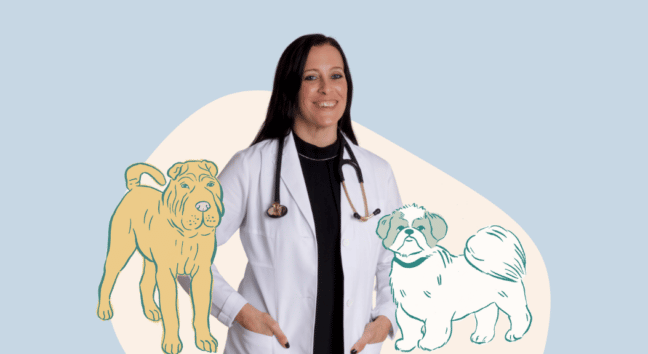

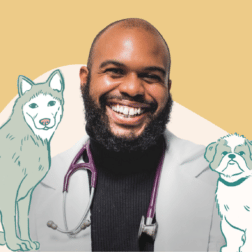
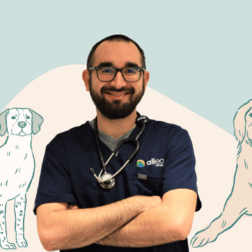
Conversation